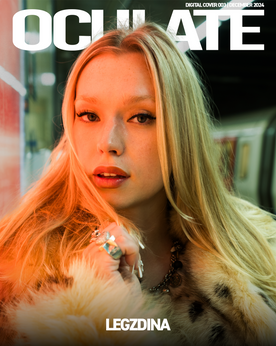Jeshi’s sophomore album, Airbag Woke Me Up, is a wake-up call in every sense.

Inspired by a near-death experience when he crashed into a car park at 5 am, the East London artist uses this project to reflect on life’s unpredictability and the hunger to grow from chaos. If his 2022 debut, Universal Credit, was about surviving, Airbag Woke Me Up is about living with intent. This is Jeshi at his most self-aware and ambitious.
From the moment you press play, you’re drawn into a world that feels lived-in yet cinematic. The project’s opener wastes no time, setting the tone with Jeshi’s sharp observations and punk-infused energy. He’s not here to comfort you. Instead, Jeshi immerses you in moments of vulnerability, frustration, and hope. Tracks like 'Hurricane' burst with visceral storytelling, while the accompanying video is a surreal, mind-melting trip that perfectly complements the track’s chaotic themes.
At its core, the album reflects Jeshi’s ethos: feeling alive by confronting life head-on. He doesn’t shy away from messy emotions or difficult truths. The album showcases his ability to turn personal turmoil into art that resonates universally. It’s a quality he’s honed since early projects like The World’s Spinning Too Fast EP and BAD TASTE, but here, it feels sharper and more refined.
What makes Jeshi stand out is his willingness to reshape UK rap’s boundaries. His sound isn’t confined to a single lane. Instead, it pulls from punk, grime, and electronic influences, creating something uniquely his. Collaborations with artists like Sad Night Dynamite and Obongjayar bring fresh textures, while his introspective lyricism remains the centrepiece embodying this balance, blending chaos with clarity.
While Universal Credit was praised for its honest depiction of social malaise and youthful recklessness, Jeshi faced criticism for being pigeonholed as a political artist. This new album pushes back against that narrative. He’s less concerned with external labels and more focused on creating work that reflects his journey.
This project feels like a sibling to Universal Credit – familiar yet different. Both albums share an autobiographical nature, but Airbag Woke Me Up feels more personal. Where his debut zoomed out to capture broader societal struggles, this record zooms in, offering a raw, unfiltered look at Jeshi’s growth. His knack for weaving humour into heavy topics remains, but there’s a new layer of maturity.
Jeshi’s collaborators further elevate this project. Whether it’s working with Lilah or Obongjayar, he brings out the best in his peers. The production on Airbag Woke Me Up balances experimental sounds with Jeshi’s distinct voice, creating a cohesive yet unpredictable listening experience. It’s this unpredictability that makes the album so engaging.
Ultimately, Airbag Woke Me Up feels like a statement of intent. Jeshi isn’t interested in playing it safe. He’s here to challenge himself and his listeners. In an industry that often prioritises trends over authenticity, Jeshi’s commitment to his vision is refreshing. This album isn’t just a follow-up to Universal Credit; it’s a bold step forward.
If you’re looking for music that pushes boundaries while staying deeply personal, Airbag Woke Me Up is essential listening. It’s an album that captures what it means to feel alive in a chaotic world. Jeshi’s ability to channel chaos into art makes him one of the most exciting voices in UK music today.













Comentarios